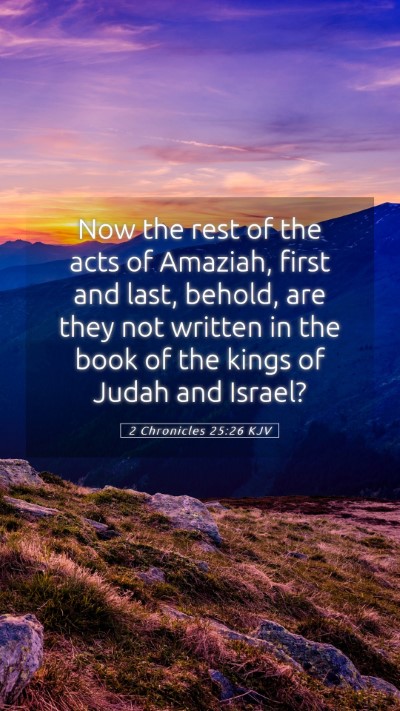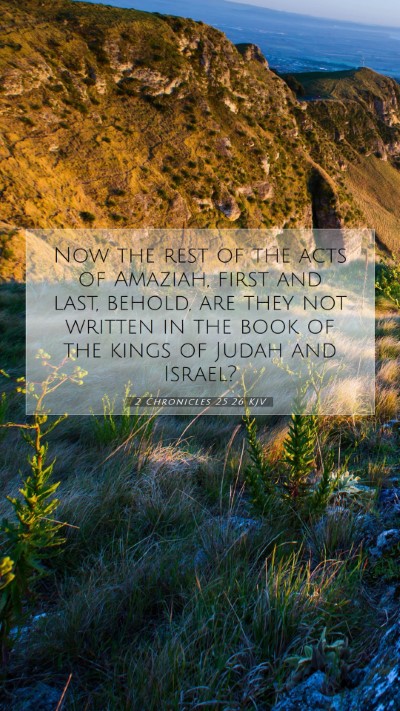Understanding 2 Chronicles 25:26
2 Chronicles 25:26 states: "Now the rest of the acts of Amaziah, first and last, behold, they are written in the book of the kings of Judah and Israel." This passage offers a summary statement regarding the reign of King Amaziah of Judah, encapsulating the idea that his deeds, both righteous and wicked, are recorded and accessible for future generations. The significance of this verse can be understood through various lenses provided by well-known biblical commentators.
Bible Verse Commentary and Interpretation
The verse holds a multifaceted meaning as reflected through the insights of Matthew Henry, Albert Barnes, and Adam Clarke.
- Matthew Henry's Commentary:
Henry emphasizes the importance of historical records in understanding God's dealings with His people. He encourages readers to see that Amaziah’s life, like others, bears witness to God's justice and providence. The 'rest of the acts' indicates that while some aspects may be missed in the narrative, they remain recorded, underscoring the faithfulness of God in maintaining an account of His people's history.
- Albert Barnes' Notes:
Barnes elaborates on the historical context, asserting that the 'book of the kings' refers to official chronicles which served to remind Israel and Judah of their covenant relationship with God. He highlights the significance of Amaziah's actions: they serve as a cautionary tale about pride and disobedience, particularly his failure to heed prophetic warnings. This serves both as a moral lesson and a reminder of God's ongoing vigilance over national affairs.
- Adam Clarke's Commentary:
Clarke suggests that this verse serves as a literary device to close the narrative on Amaziah. He notes the implications of being remembered for one's actions: it is a warning to readers to act righteously, as the accounts of lives are preserved and shared. Clarke adds an interpretative layer regarding the nature of biblical history, emphasizing that what is recorded in scripture has eternal significance.
Theological Insights
This verse is deeply connected to themes of accountability and Divine sovereignty. It serves as a reminder that all actions matter, as they are recorded in Heaven, prompting readers to engage in self-examination regarding their spiritual walk.
Cross References
- 1 Kings 14:29-31: Discusses the records of the acts of the kings of Judah.
- 2 Chronicles 26:1-5: Provides an account of the reign of Uzziah, Amaziah's son, which enhances understanding of succession and divine favor.
- Proverbs 16:2: Emphasizes that human intentions are known to God, a theme reflected in the life narratives of biblical figures.
Applying 2 Chronicles 25:26 to Daily Life
To apply the insights gained from this verse, consider the following:
- Reflection: Reflect on your actions and their alignment with your values and beliefs. How are you contributing to a legacy that will be remembered?
- Moral Accountability: Recognize that your deeds are significant in the larger narrative of your life. How can you ensure that you leave a positive legacy?
- Seek Wisdom: Engage with Scripture and trusted biblical commentaries to gain deeper insights into your life situations and decisions.
Conclusion
This study of 2 Chronicles 25:26 provides a profound understanding of how lives are not only lived but are also recorded. Through the lens of different commentaries, we come to appreciate the theme of accountability, the importance of historical records, and the impact of our spiritual choices. As you continue your Bible study, remember that each verse holds layered meanings that connect our daily lives to the larger narrative of faith, obedience, and divine justice.


